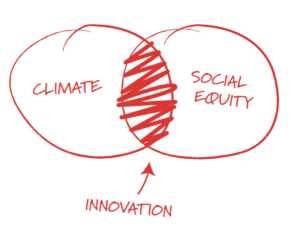
For us to avoid the worst effects of climate change, we need to keep global warming under 1.5C. This is the goal of the Paris Climate Agreement. For us to accomplish that, we need to end our use of fossil fuels by 2050. And to make progress toward that goal, we must reduce our carbon emissions by half globally by 2030. Read more.
Each of us within our daily lives can work to achieve that goal, such as driving and flying less, eating less meat, and breaking our addictions to consumerism. Yet, we must also work through all levels of government and all the organizations we touch so that we, acting as a people, can tame climate change with effective and equitable policies and programs. This is called democracy.
 More than 150 cities across the U.S. have already implemented or are developing community-wide climate action plans, and more continue to announce their plans. Simply, climate action plans are equitable and effective strategies that work to reduce the carbon emissions of a city to achieve the goal of limiting global warming to 1.5C. A city-wide community action plan also provides a structure through which the community can partner in carbon reduction efforts.
More than 150 cities across the U.S. have already implemented or are developing community-wide climate action plans, and more continue to announce their plans. Simply, climate action plans are equitable and effective strategies that work to reduce the carbon emissions of a city to achieve the goal of limiting global warming to 1.5C. A city-wide community action plan also provides a structure through which the community can partner in carbon reduction efforts.
For a summary of what other cities are doing, read more.
Because so many other cities have worked on this already, our community can learn their best practices. Examples that cities across the county have adopted include community-wide renewable energy targets, reducing the energy use of commercial buildings and homes, increasing access to EV charging stations, and increasing use of public transportation and bikes.
Increasingly, cities include equity in their climate action plans in meaningful ways. We must avoid increasing the burden on those least responsible for climate change. Policies that promote equity include green jobs, energy efficient affordable housing, improved public transportation systems, and community solar. A Knoxville climate action plan can make equity and empowerment a fundamental principle. Read more.
action plans in meaningful ways. We must avoid increasing the burden on those least responsible for climate change. Policies that promote equity include green jobs, energy efficient affordable housing, improved public transportation systems, and community solar. A Knoxville climate action plan can make equity and empowerment a fundamental principle. Read more.
 And these climate action plans are not just government plans. They are comprehensive community-wide efforts that engage the whole community – from neighborhood associations and nonprofits to schools and universities, from small businesses to corporations, from churches and social groups to hospitals and other institutions, from music festivals to conferences. Not only does the community need to help develop a city-wide plan, but each and every household and organization needs its own plan to reduce its carbon emissions by half by 2030.
And these climate action plans are not just government plans. They are comprehensive community-wide efforts that engage the whole community – from neighborhood associations and nonprofits to schools and universities, from small businesses to corporations, from churches and social groups to hospitals and other institutions, from music festivals to conferences. Not only does the community need to help develop a city-wide plan, but each and every household and organization needs its own plan to reduce its carbon emissions by half by 2030.
For a summary of what other cities are doing, read more.
